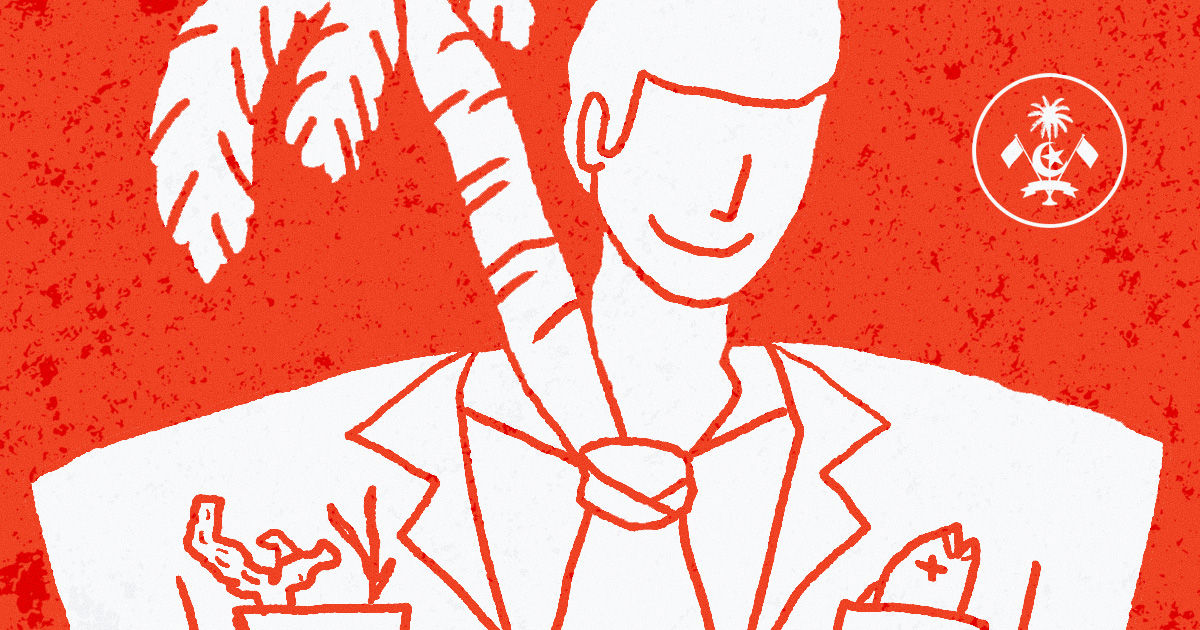Ministry merger sparks fears of environmental oversight collapse
Advocates warn the move could compromise environmental protection.

Artwork: Dosain
06 Feb 2025, 20:30
The government’s decision to merge oversight of the US$ 5 billion tourism industry with the environmental regulator has been met with frustration and alarm across both sectors.
On Sunday, the president created the new Ministry of Tourism and Environment, combining the Ministry of Tourism and the Ministry of Climate Change, Environment and Energy.
"General consensus is this: what the hell is going on," a senior tourism industry official told the Maldives Independent.
The decision came after the sacking of former Tourism Minister Ibrahim Faisal amid a fallout between his father - embattled Speaker Abdul Raheem Abdulla - and President Dr Mohamed Muizzu.
Former Environment Minister Thoriq Ibrahim was appointed to lead the newly formed ministry.
Thoriq was previously responsible for overseeing environmental protection and climate change adaptation, and for ensuring regulatory standards for energy and water. The tourism ministry has the authority to lease islands and lagoons for resort development.
Regulatory Overlap
The mandates of the tourism and environment ministries overlap in several key areas.
The Environmental Protection Agency, which reports to the minister, approves environmental impact assessments for all development projects.
The tourism industry accounts for the largest infrastructure development across the Maldives. Out of 143 ongoing projects, 119 projects involve the construction of luxury resort facilities on lush uninhabited islands. A further 30 “mega projects” require dredging in shallow lagoons to create manmade islands, and sourcing trees and palms to green the reclaimed land.
The EPA must approve and issue permits for all such work. Though rarely exercised, the agency has previously rejected projects based on impact assessments. But the environment minister has the power to overrule these decisions.
A key challenge identified across different governments, waste management is another area rife with potential conflict. The state-owned Maldives Waste Management Corporation reports to the environment ministry, which sets standards and enforces regulations.
On average, a tourist produces 3.5 kg of waste per bed-night, far higher than the 1.7 kg per day generated by local residents of the capital. The figure is 0.8 kg per day for people out of the Greater Malé Region, according to government statistics.
The EPA has fined resorts on several occasions for illegally dumping waste. In 2022, the Vaavu Atoll Council asked the EPA to investigate resorts suspected of dumping waste into the ocean. According to the UNESCAP Maldives National Waste Accounts for 2018 and 2019, some resorts transfer all of their waste out of the island, a practice that must adhere to EPA standards. Resort waste must only be taken to designated regional waste stations.
In November, the EPA revealed in response to a right to information request that it had officially communicated with 10 resorts over illegal waste dumping on inhabited islands. It was unclear whether any action had been taken.
In 2015, during former president Abdulla Yameen’s administration, the tourism ministry seized the EPA’s regulatory powers for tourist developments. The environment minister at the time was Thoriq Ibrahim was the environment minister. The policy was later reversed by the next administration.
Forced marriage
"This is a disaster for our environmental protection standards," Humaida Abdul Ghafoor, an environmental campaigner with the Save Maldives campaign, told the Maldives Independent.
"It was a terrible decision that Thoriq Ibrahim was reappointed to the Ministry of Environment by the current administration, given his record of ecocide in Kulhudhuffushi. The impacts of this irresponsible decision-making continue to negatively affect the ecology, biodiversity, living environment, livelihoods, and economic resilience of the people of Kulhudhuffushi today, increasing the debt burden of an already indebted nation," she said.
Humaida, more commonly known as Humay, an outspoken critic of environmental degradation and unsustainable development, called Thoriq’s new portfolio “a regressive development for ecosystem preservation and climate resilience of our islands.”
Speaking to the Maldives Independent, Afrah Ismail, co-founder of Zero Waste Maldives, referred to the failure of successive administrations to fulfil a constitutional mandate to protect and preserve the fragile environment of the Maldives.
“With this merger, the environmental policymaker and regulator are being forcibly married to the industry that has been exploiting our vulnerable environment with impunity,” he observed. “The little tokenistic oversight that existed will also cease to exist now.”
MP Mauroof Zakir from the main opposition Maldivian Democratic Party echoed their concerns.
"Environmental safeguards are critical for the future of the tourism industry. Environmental protections are compromised when investors and tycoons lobby so that they can further their business interests, Mauroof, who is also the general secretary of the Tourism Employees Association of Maldives, told the Maldives Independent.
"The question is, which interests will the ministry protect? The interests of the tourism industry or the vulnerable natural ecosystems of Maldives?”
According to the President's Office, Muizzu instructed Thoriq to promote Maldives "through an integrated approach that highlights the synergy between the nation's environmental heritage and its tourism sector."
When the Maldives Independent sought comment from the President’s Office, Communications Minister Ibrahim Khaleel referred to the 2015 transfer of regulatory powers to the tourism ministry.
“Don’t you remember?” he asked, offering to arrange a call with the new tourism and environment, who was yet to respond at the time of publication.
On Monday, Thoriq told the local daily Mihaaru that he was confident of handling the expanded mandate. “I have been in charge of the tourism ministry for about 48 hours. We are now identifying and studying the changes that need to be made. I believe this is possible," he was quoted as saying.
Thoriq also faces a more immediate logistical challenge. The tourism ministry is located in the Velaanaage office complex, a 15-minute walk from the environment ministry, which is temporarily housed at the Dharubaaruge convention centre. It is unclear whether the government plans to bring both offices under the same roof.
More red tape or efficiency?
The possible conflict of Thoriq’s dual mandates was acknowledged by tourism industry officials, most of whom spoke to the Maldives Independent on the condition of anonymity due to fear of reprisal.
"It might be a good, advantageous thing for resort owners. This way, the EPA and the environment ministry are hijacked by the tourism ministry," said a senior manager at a local tourism company.
But others raised concerns about the overlap and more bureaucracy.
"To put it simply, this is like putting a thuggish stepmother and a cruel stepchild in the same room and spraying pepper into the room,” Shaaz Waleed, owner of Resort Life Private Limited, suggested.
“They will fight, verbally and physically. Think about the results. When the role of the environment ministry is to oversee and reprimand unsustainable practices, including from the tourism industry, what will be the result if these two are merged?" he added.
Some stakeholders feared the government would now pay less attention to the tourism industry.
"When the government shows a lack of focus on major industries, investors will see it as a bad signal. They will question it, and it will affect investor confidence," said a senior management official of a guesthouse chain.
A senior official at the Maldives Association for Tourism Industry - an influential lobbying group of resort operators - thought it was too early to tell “whether bureaucracy and inefficiency will increase or whether things will get easier.”
“Only time will tell," the MATI official said.
Discussion
No comments yet. Be the first to share your thoughts!
No comments yet. Be the first to join the conversation!
Join the Conversation
Sign in to share your thoughts under an alias and take part in the discussion. Independent journalism thrives on open, respectful debate — your voice matters.




